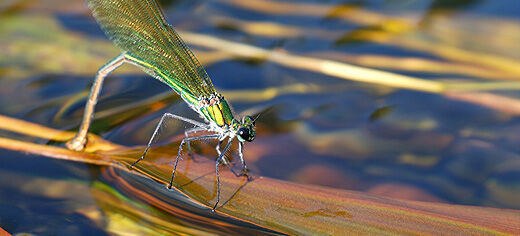
Critically low water levels in many rivers could lead to the partial collapse of food webs that support aquatic life, according to a study co-authored by a University of Leeds researcher.
In one of the longest experiments on drought ever conducted in freshwaters, the team periodically lowered water flow in artificial streams, mimicking severe drought conditions in natural running water.
They looked at a broad range of aquatic animals and plants and studied the response of the entire food web - essentially the road map of who-eats-whom in nature.
The results are published today in Nature Climate Change.
Dr Lee Brown of the School of Geography at the University of Leeds said: "These findings demonstrate that the future intensifications of drought, similar to those seen in the UK earlier this year and ongoing in the central and midwest states of America, can be expected to have major effects on both biodiversity and ecosystem processes in streams and rivers."
Dr Mark Ledger from the University of Birmingham's School of Geography, Earth and Environmental Sciences, who was the lead author of the study, said: "We found that drought changed the make-up of the invertebrate life in the stream community and reduced its diversity by around 25%."
Dr Ledger noted that many insects such as mayflies were severely affected by drought, as were many large predatory invertebrates, which could not escape.
"Our study demonstrates that the loss of invertebrates limits the flow of food energy through the food chain, with potentially profound consequences for the health of river ecosystems," he said. "We discovered that, in particular, drought had negative effects on large bodied invertebrates, an important food source for fish, which has significant implications for fisheries."
The research team also included scientists from Queen Mary University of London (Dr Guy Woodward) and the Centre for Ecology and Hydrology (Dr Francois Edwards). It was funded by the Natural Environment Research Council and the Freshwater Biological Association.
Further information:
Contact: University of Leeds Communictions & Press Office. Tel: +44 113 343 4031 or Email: pressoffice@leeds.ac.uk
The full paper: M Ledger et al, 'Drought alters the structure and functioning of complex food webs' is published in Nature Climate Change (http://dx.doi.org/10.1038/NCLIMATE1684)